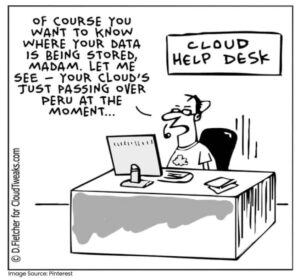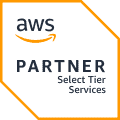 Here is a popular joke about the increasing popularity of cloud computing technologies in recent times.
Here is a popular joke about the increasing popularity of cloud computing technologies in recent times.
Today, cloud computing has become so popular that almost every IT resource is being moved to the cloud and delivered over the Internet via a pay-per-use model.
However, cloud computing is not a silver bullet. You can’t just click a button to make everything cloud-enabled.
To fully leverage the cloud revolution, it is important to identify your cloud computing needs and design the right cloud strategy. Choosing the right cloud computing provider is the key here.
Here are the top 10 questions to ask your cloud computing provider before hiring one.
1) Services Portfolio
Before moving to the cloud, organizations should identify their cloud computing needs and document the requirements. Once you have this document ready, the first and foremost question to ask your cloud provider is about their portfolio offerings. What are the cloud services they offer? If they don’t offer the services required by your company, there is no point in further negotiations with the company. You can delete it and move with other companies in the list.
2) Subscription Models
Another important question to ask your cloud service provider is about how they charge for the services offered and how flexible is their payment structure. The cheapest services should not be the first choice. While the price is an important factor, align it with the services to make a decision. While most cloud services are normally offered via a pay-per-use model, the charges differ based on the instances, servers, users, groups, regions etc. In addition, check out the payment period – monthly, quarterly, annually etc.
3) Cloud Security
One of the main barriers to cloud adoption for many organizations is data security. As such, check out the security policies and cyber security measures implemented by the company. Multi-factor authenticating (MFA) is not an option anymore. So, check out if they offer a multi-factor authentication system? In addition, intrusion detection, data encryption, incident prevention mechanism, firewalls and visibility into network security are some of the key requirements to consider.
4) Data Storage Location

The location of the datacenter can affect the performance and reliability of your applications. Choosing a datacenter closer to your business operations will give you an added advantage. As such, ask the cloud provider about where they store your data and what security policies they have in place.
Does it have a fall-back center to handle natural and accidental disasters? Another reason to know the datacenter location is that companies are required to comply with data regulations of their regions. So, it is important to know the data storage location for audit and compliance purposes too.
5) Service-Level Agreements (SLAs)
Before subscribing to a cloud service provider, it is important to define your expectations related to their services. So, check out how they measure the services and how they compensate for service outages. Going through their SLA agreement will help you in this regard.
6) Flexibility in Services
One of the biggest advantages of cloud solutions is the flexibility it offers in adding or terminating services on-demand. So, check out with the provider if you can instantly add or modify services on the go and how easy it is to make changes to your services. For instance, short-term projects require short-term resources on-demand. It will help your team to experiment with new ideas. In addition, check out if you can scale up and scale out resources without downtimes. If an autoscaling feature is available, that would be great.
7) Customer Support 24/7
Regardless of how good a cloud company is, there will be times you might experience a service outage or other technical issues. In such instances, you need a support system that can instantly resolve your issue. So, check out with the cloud provider if they offer customer support that is available 24/7/365 as you need the support service on holidays and weekends as well. In addition, find out the available support options such as phone support, chatbot service, email etc.
8) The History of Downtimes
While no cloud company can guarantee 100% uptime, the best cloud provider should be able to quickly resolve technical issues and minimize downtimes. So, check out the downtime history of the company and what steps they have taken to get things back on track. You can also check out these details on their website and review sites to assess the availability of their services. You don’t want to join hands with a company that has frequent outages.
9) Data Control
While using a cloud service, the cloud provider takes care of the infrastructure while you focus on your business operations. However, it is important to know how the data is handled and what type of control you have over the data. Would you be able to retrieve all your data without the assistance of the provider in case you want to change the provider or terminate the services? In addition, it is important to know how long they will store the data after the service agreement comes to an end. What type of data formats are available is another aspect to check out.
10) Does the company make timely backups?
Data backup and recovery is key to safeguarding your business information. So, check out if the company performs timely backups so that you can restore a recent backup when the data is lost or erased. In addition, check out their disaster recovery plan. Do you have recovery measures in place to instantly recover data or prevent a disaster to happen? A cloud computing company without a DR plan cannot be trusted.
The cloud market is flooded with multiple cloud service providers. So, it is important to eliminate companies that are inefficient, incompatible and unreliable. In addition to asking the above questions, you need to check out the reputation of the company, their references, feedback on review sites and social media platforms etc. Taking time for these tasks will save your business from incurring huge losses in the long run.






